General
The overall goal of the Prevention department with respect to organised sports and elite sports is: the prevention of inadvertent and deliberate doping violations in Dutch sport.
Sports organised outside a club context (in other words, the fitness sector) have no doping regulations or doping controls. The goals for this sector are therefore formulated from the perspective of public health and they are as follows: the prevention of deliberate and inadvertent doping, or the prevention of harm to health or additional harm caused by doping (harm reduction)'.
The main target groups are:
- elite athletes (including elite athletes of the future);
- athletes and fitness professionals in sports organised outside a club context (fitness);
- support staff (in particular trainers/coaches, sports doctors and GPs, physiotherapists, dieticians, masseurs and parents);
- sports associations;
- the general public.
Information activities in the context of sports organised in a club context cover the doping regulations and the risks of doping. In addition, healthy and legitimate alternatives for improving performance are discussed, and efforts are made to foster or reinforce an anti-doping attitude among athletes.
Since 2015, information for elite athletes in particular has been structured using the Ongoing Educational Module for Doping-Free Sport (DLDS). The DLDS describes the knowledge, skills and attitude needed for doping-free sports for all ages and development phases. In line with these phases, three different information packages have been developed for athletes: Bronze, Silver and Gold. Each package consists of face-to-face education, a test and (with effect from 2017) e-learning.
- Bronze (for the age group ±15 years) is an introduction to the topic of doping. The topics covered here are the doping regulations, doping controls and the risks of inadvertent doping.
- Silver (±17 years) focuses more on practising skills. It is assumed that the information from bronze is known, and the focus is more on practical matters. There is, for example, an opportunity to practise using the Doping Information App.
- Gold has been designed specifically for elite athletes with a whereabouts obligation. This category discusses the whereabouts regulations in detail but also looks at difficult doping dilemmas that athletes may encounter, such as doping violations by other members of a team, or using medicines to perform better.
The first steps were taken in 2016 towards providing the Bronze package through e-learning.
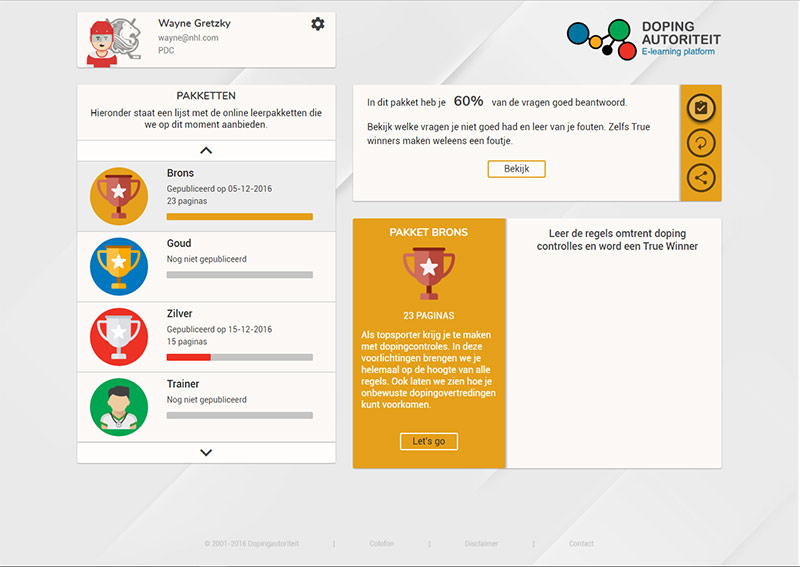
Meetings for support staff cover the same issues as those discussed with athletes, but also focus on the rights and, above all, the obligations of support staff, as well as factors that exacerbate or mitigate the risk of doping. An Ongoing Educational Module for Doping-Free Sport was also developed for trainer levels 3, 4 and 5 in 2016. This formulates in more concrete terms what knowledge, skills and attitudes coaches require.
The target groups in sports organised outside a club context consist primarily of fitness athletes and fitness professionals. A website, articles and books have been produced for the fitness athletes. In addition to the website, articles and books, the main information activity for the fitness professionals target group consists of guest talks at the various fitness centres. These talks look at the different types of doping, the risks of use, the way the substances work and the side-effects, fact and fiction relating to supplements, doping prevention and the Own Strength programme. There is also a focus on harm reduction: reducing the risks (and particularly the health risks) for users.
The corporate website (www.dopingautoriteit.nl) and the websites www.dopefree.nl and www.eigenkracht.nl are important ways of communicating with the various target groups. Anyone with doping-related questions can send an email to the Doping Email Line. Answers are sent within one working day.
In order to establish a clearer picture of when we use which logo (Doping Authority, 100% Dope Free and Own Strength), we called in a branding and communications firm. Explanations about doping regulations come from the Doping Authority. 100% Dope Free and Own Strength are offered as a platform or supporters club where athletes and support staff can state their support for clean sports. These steps have led to the diversification of the styling for information materials.
Elite Sport
www.dopefree.nl
The website of 100% Dope Free underwent a major overhaul in 2015 and the name has been changed to www.dopefree.nl. The site plays a central role in this prevention programme for elite athletes of the present and future. Twelve news items were posted on the website in 2016. They are sent immediately to all subscribers (numbering about 14,500).
The digital Bronze, Silver and Gold tests have also been added to the website. The tests consist of 10 true/false questions and they are used to test what the athletes have learnt at the end of an information meeting. During a test (on smartphones or tablets), the scores can be followed live on a large screen. A test can also be completed outside the context of a meeting.
100% Dope Free - True Winner
This part of the programme (which began in December 2007) gives elite and competition athletes the opportunity to sign an anti-doping statement and to adopt an active stance in favour of clean sports. Once they have signed the statement, the athletes receive the gold wristband to symbolise the fact that you are only a true winner if you perform without doping. The number of signed statements increased from 30,600 to 32,600 in 2016 (+2,000).
This component was developed and implemented in collaboration with the NOC*NSF Athletes Committee. Our ambassadors at the end of 2016 were: Femke Dekker (rowing), Carl Verheijen (speed skating), Richard Bottram (marathon 365 & Wheel of Energy), Epke Zonderland (gymnastics), Mirjam de Koning-Peper (swimming), Thijs van Valkengoed (swimming), Churandy Martina (athletics), Marianne Vos (cycling), Vince Rooi (baseball), Bauke Mollema (cycling), Madelein Meppelink (beach volleyball) and Jetze Plat (handbiking/triathlon).
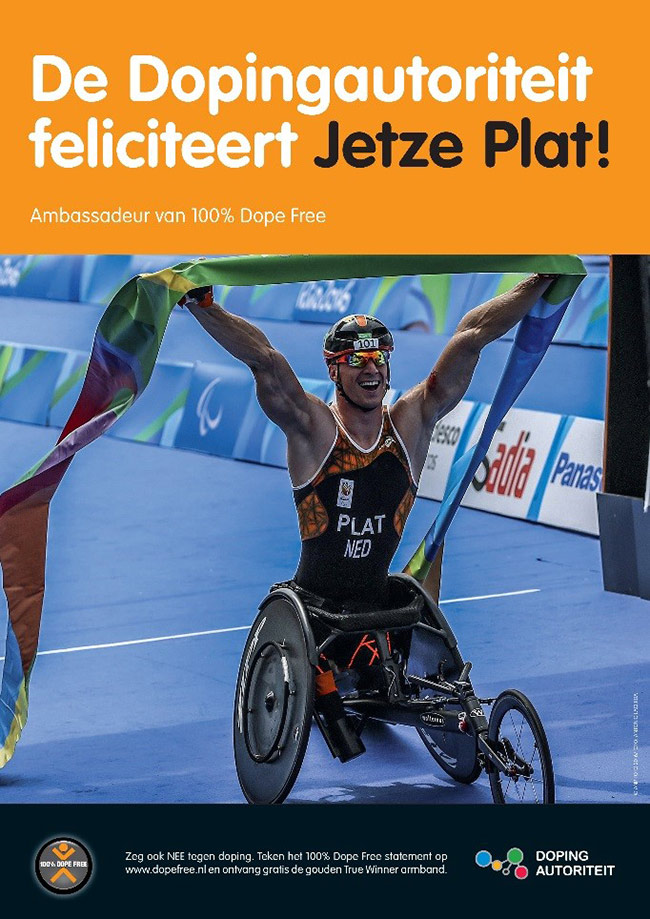
Information meetings and materials
The Ongoing Educational Module for Doping-Free Sport was introduced in 2015. Agreements have been made with various associations about which information (bronze, silver or gold) is most appropriate for which groups of athletes. That led to a sharp increase in the number of information meetings. From 36 in 2014 to 65 in 2015 and 80 in 2016.
Development of E-learning
To extend the reach further, we began on the development of an e-learning platform in late 2016. This platform provides access to several e-learning modules, such as Bronze, Silver, Gold and modules for coaches.
Z card
A new Z card was produced in 2016 entitled: 'Stay Negative - Tips for clean sport'. It contains the eight most important tips for keeping sports clean.
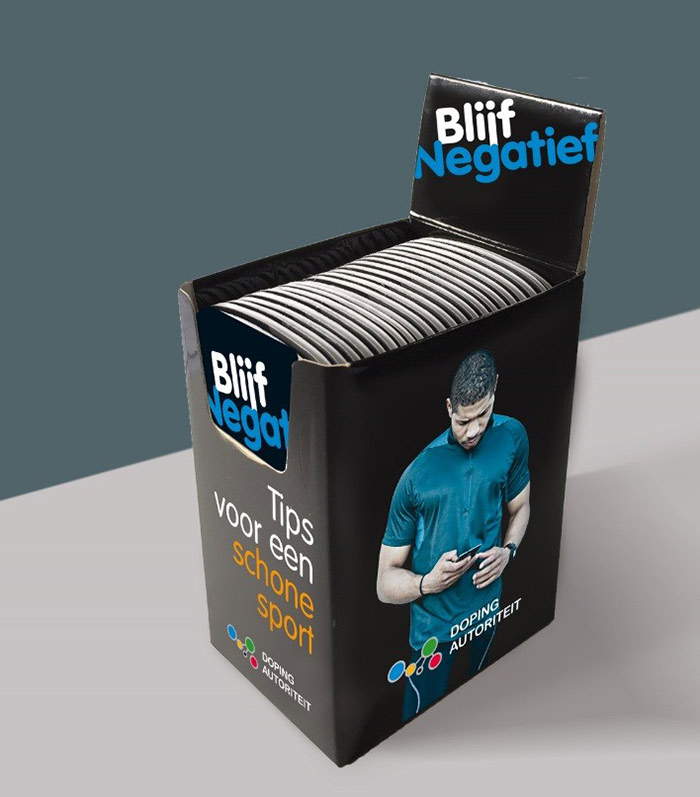
Video of doping analysis in a doping laboratory
Recordings were made in November for a video showing the analysis process in a doping laboratory. The video shows what happens to samples in the lab. The presenter of Bureau Sport, Frank Evenblij, was the interviewer. Recordings were made in, among other locations, the DoCoLab in Ghent.
Outreach Events
There were four outreach events in 2016. A deliberate decision was made to visit sports events with the aim of providing general information for large groups of athletes (and in particular young and talented athletes), parents and trainers/coaches. There were also opportunities to sign the 100% Dope Free – True Winner statement and to complete the WADA doping quiz. The outreach events were organised at: the participants meeting for the Young Olympic Winter Games, the ITU 2016 Triathlon Championships (paratriathlon), the National Cycling Team Pursuit Championships, and the National under-18 Judo Teams Championships.
Articles
The Doping Authority has a regular spot in the NOC*NSF elite sports magazine Lopend Vuur. Eight doping-related articles were published in 2016.
Doping Information App
The Doping Information App (iOS and Android) appeared in late 2013. There is a responsive website for other systems: www.dopingwaaier.nl. The app had been downloaded 18,614 times at the end of 2016, an increase of 5,457 (the increase was 4,761 in 2015).
The Doping Information App is always kept up to date. The Doping Hotline and the Bronze test (under 'Quiz') were added to the menu in 2016.
In order to maintain the focus on the Doping Information App, Z cards, digital ads, posters and information meetings provide a large range of target groups with information about the App.
Dutch Safeguards System for Dietary Supplements in Elite Sport (NZVT)
A total of 281 NZVT certificates were issued in 2016 (for 488 product-batch combinations). This is the highest number ever, a sign that the Dutch Dietary Supplements system (NZVT) is still catering to a significant need of athletes and their support staff. At the same time, seven batches have been rejected this year because listed substances were found in them, which is a strong signal that the risk of consuming a contaminated supplement is still very real. The system was established in 2003 and, as evidenced by the numbers of positive doping controls that can still be linked to 'contaminated' dietary supplements, a testing system of this kind continues to be necessary. In total, on 31 December 2016, there were 955 product-batch combinations on the NZVT website (antidoping.nl/nzvt) representing 270 products, 48 brands and 16 substantive categories.
A switch was made last year from the laboratory in Cologne to the LGC laboratory in London for analyses.
Together for clean sport
At the National Doping Conference on 23 April 2015, Minister Schippers granted financing for a follow-up to Racing for clean sport. Six organisations then drew up an action plan: the Dutch Athletics Union, the KNBB (billiards), the KNVB (football), Fit!Vak, the Doping Authority and the NOC*NSF (the coordinator). The plan was given the name: Together for clean sport. On 28 February 2016, the Dutch Indoor Athletics Championships was the backdrop for the launch of the project with all parties involved. The campaign 'Athletics, just clean' was also launched at the same time. It brings together a number of elite athletes (including Dafne Schippers and Churandy Martina). The sports associations involved and Fit!vak started off the project with a study of how much their constituents know about doping. A range of actions and materials were developed on the basis of the results. As part of this project, the Doping Authority has produced animations about the NZVT, therapeutic exemptions, drugs and tips for a clean sport (in line with the Z card). An animation was developed in 2016 providing a basic explanation of the doping regulations.
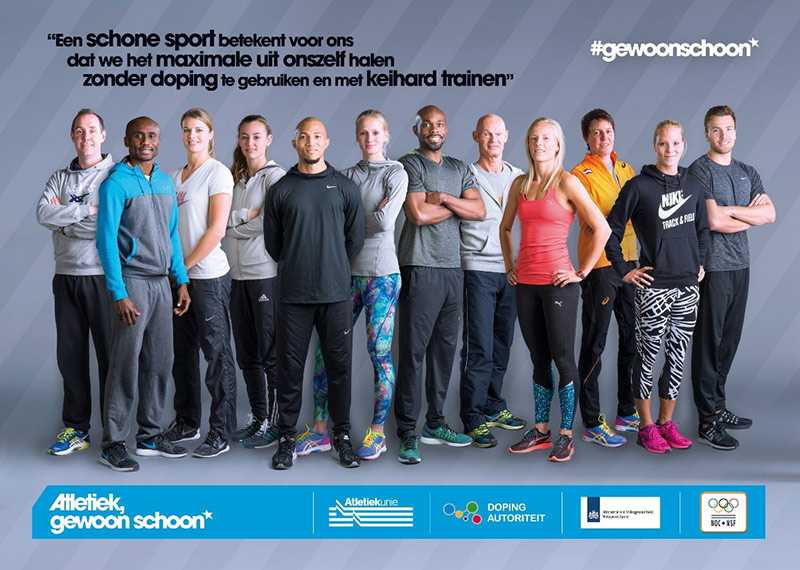
Sports organised outside a club context
Own Strength programme
The main target group in sports organised outside a club context consists of: visitors to fitness centres and their immediate circles. The latter category consists primarily of fitness instructors but also entrepreneurs in this branch.
www.eigenkracht.nl
The Own Strength website plays a central role. Alongside text, videos are being used more and more. In addition, there are four full annual programmes for four different training goals. The weekly web reports are placed in files on topics that include training, nutrition, supplements, doping, health, etc. This makes it easier for visitors to find extensive information about specific topics.
The site specifically targets athletes/cosmetic athletes in fitness centres. It provides objective, clear and practical information about how to build up muscle mass cleanly and effectively, and about sound ways of losing weight. There is also objective information about various types of prohibited substances and the side-effects, and the doping risks of dietary supplements are discussed.
In 2016, a total of 49 factual news reports were posted on the site. They were written by three external experts (journalists or specific experts) from the fitness/bodybuilding branch and by our own prevention officers.
Videos
The documentary 'Bigger than big - The evolution of bodybuilding?' (Groter dan groot - De evolutie van bodybuilding?) was screened in the Lantarenvenster cinema in Rotterdam on 10 September. There was then a discussion and a presentation by endocrinologist Pim de Ronde focusing on the HAARLEM study (health risks of anabolic androgen steroid use by male amateur athletes; see also Chapter 7). The documentary and the associated report can be found on the Own Strength and Doping Authority websites. A version of the documentary with English subtitles has also been produced. The documentary will be sent to a number of NADOs so they can include it in their communications strategies. The documentary will also be used during a range of information activities.
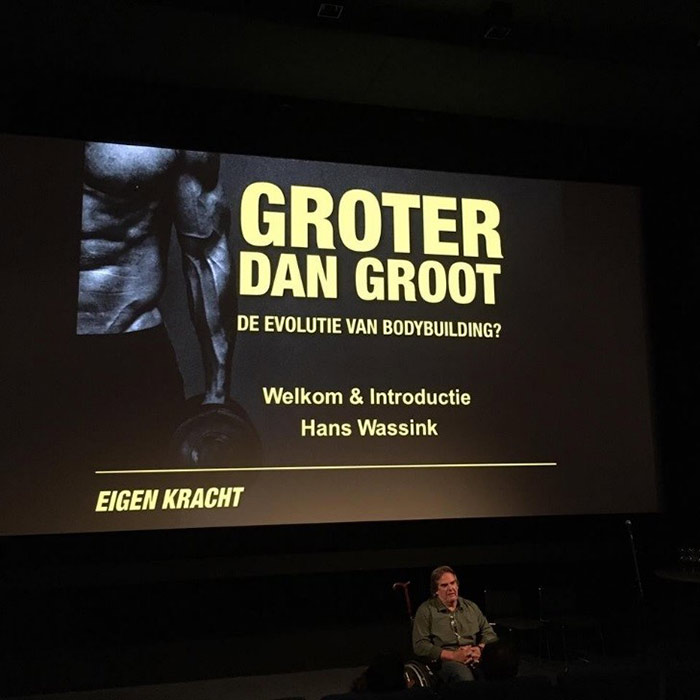
Two interviews from the documentary have also been used as a basis for sixteen shorter videos. These are the interviews with Dr Pim de Ronde (of the Steroids Clinic) and Hans Kroon, the strength training coach at Fitnesscentrum Noord in Rotterdam.
To show that you can develop an impressive physique on your own, a video has been produced with the elite heavyweight judoka Roy Meyer.
Fitness courses & meetings
In 2016, the Own Strength programme organised 18 guest lectures (13 in 2015) for numerous educational institutes and private fitness institutions. The Own Strength water bottle was handed out during those talks to trainee fitness instructors.
The SAP CUP event was organised on 10 and 11 December 2016. This is the largest fitness/strength sports event in the Benelux. A total of more than 7000 visitors attended the event during the weekend.
In addition, we were involved in an information/discussion evening for younger bodybuilders (including users of prohibited substances) on 15 December at the request of the Menswel foundation in Heel. The thinking was to discourage the use of prohibited substances.
At the request of, and in collaboration with, a number of institutions for welfare and substance abuse, a folder was produced for health professionals in 2016 describing the effects of anabolic steroids.
Clean Hunks
Clean Hunks are fitness athletes/body builders who have demonstrated, and continue to demonstrate, that you can build up an impressive physique without dope. They are the ambassadors for doping-free fitness. Another Clean Hunk joined the campaign in 2016, bringing up the total to 18. They are all on the site, which includes background stories and photos. A number of profiles were updated in 2016.
Articles
Since 1997, Own Strength has had a regular column in the popular bodybuilding magazine Sport & Fitness Magazine. Acting under its own editorial responsibility, the Doping Authority again supplied objective information in each issue about prohibited substances and related matters. Since 2014, the approach has been to place several short reports rather than a single large article. This approach was seen in all six issues in 2016.
Since August 2015, Own Strength has been publishing a large article every month in the popular bodybuilding & fitness magazine Muscle & Fitness. Those articles are also posted also on www.eigenkracht.nl after the magazine has been issued.
Advertisements
Two new banners/advertisements were produced in 2013 portraying two Clean Hunks (a man and a woman), who are also the face of the new website. After the publication of Doping, the sober facts, an advertisement was also produced for that book. These three advertisements appeared again in 2016 on several occasions in Sport & Fitness, Muscle & Fitness, and Fit!vak magazine.
Book: 'Doping, the sober facts'
Doping, the sober facts was published in October 2014. Since then, the book has been promoted in advertisements in bodybuilding magazines and journals of Arko Sports Media. There is still a lot of interest in the book and a lot of copies have been sold.
'Own Strength' book
The last edition of the 'Own Strength' (Op Eigen Kracht) book was published in 2008. There have been some changes since then. The book has therefore been almost entirely rewritten by two authors from inside the organisation and four from the outside who are all authorities in their field. Part of the book was revised in 2016.
Supplements Guide App
Work started on the design of the supplements guide app in 2015. Fitness athletes, and also other athletes and support staff, have more and more questions about the facts and fiction relating to all kinds of nutritional supplements. This app makes it possible to check a supplement on the basis of the ingredients. The app includes other functionalities such as the basics about supplements, health risks, NZVT, alerts, news, a knowledge quiz, etc. A database was established in 2016 and almost 1000 ingredients were listed and evaluated. Details about each ingredient (whether they are prohibited substances, dangerous or dubious) can be listed so that it is immediately clear to see whether there is a problem with the ingredient. In addition, the evaluations state whether the claims relating to the ingredients are justified. The details, claims and judgments are shown using icons. And finally, there is a 'profile' for each ingredient. This is a short description of origin, claims and research/evidence. The app also includes a glossary.
Support staff
In addition to the focus on athletes, there has been an increase in recent years in the emphasis on the people in the circles around elite athletes of the present and future. Support staff can play an important role in a positive sense. Trainers and coaches in particular can play an major role. In addition, medics and paramedics are an important target group.
Because the Doping Information App is also a major source of information for support staff, it was again featured in advertisements in 2016. A poster/advertisement was also produced for the new Z card 'Stay Negative – Tips for clean sport'. It appeared in, among other places, the magazine Sportgericht.
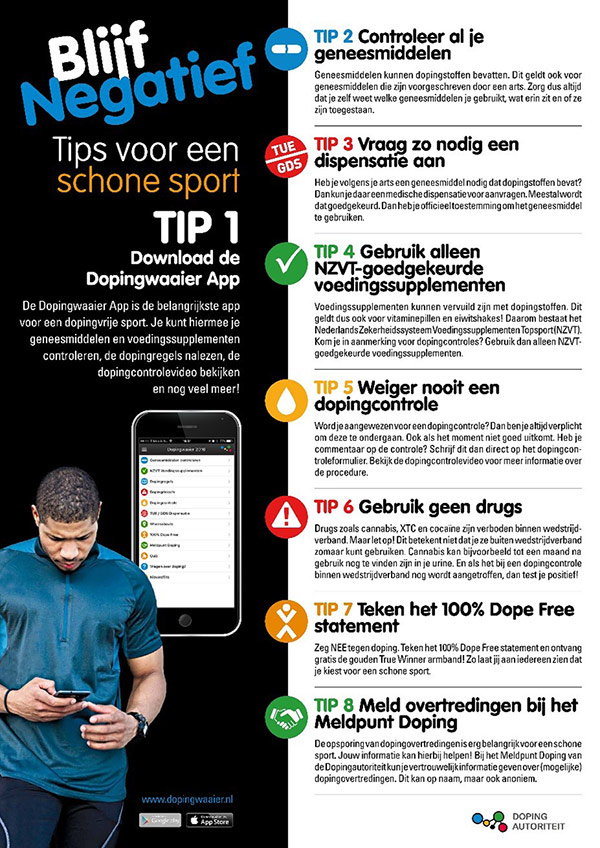
Coaches
There were a number of presentations at a range of coach courses and/or refresher training events, such as:
judo coaches, boxing trainer/coach 3, cycling coach 3, the Master Coach course in Heerenveen, the minor in sport coaching at the ALO in Amsterdam, pool trainers 3, korfball coaches 4 and carambole coaches.
An incentive was developed specifically for coaches: the Coach Negative Coaching Folder. It is handed out to students at training institutions. A new design was produced in 2016. The previous design was in the 100% Dope Free style; the new one has adopted the Doping Authority house style.
The Doping Authority had a stand on 9 December at the NL Coach annual conference, which was attended by more than 400 people in total. The goodie bag included the new Z card 'Stay Negative - Tips for clean sport'.
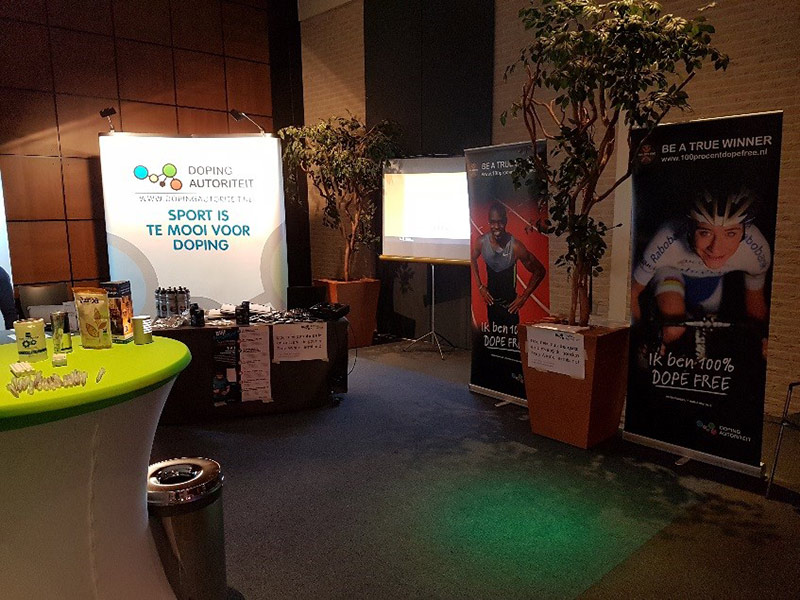
Medics/paramedics and other support staff
We gave presentations at a range of courses, such as the Sports Physiotherapy course (2x), the two Sports Nutrition courses, the Royal Dutch Cycling Union courses for team leaders and soigneurs, Sports Psychology at the Radboud University of Nijmegen, the course for Indoor Football trainers from the Royal Netherlands Football Association, refresher training for club doctors and consultants from Professional Football Organisations (BVOs), a guest lecture for medical students at the Amsterdam Medical Centre, two guest lectures for Chemistry & Crime students at Hogeschool Rotterdam, and a guest lecture for the practical sports psychology course at the VU University of Amsterdam.
Sports associations
Meeting of sports associations
The annual meeting for the staff of sports associations Samen tegen doping! (Together against doping!) was organised for the seventh time. It took place on 11 October 2016 in Nieuwegein and approximately 60 people attended. They were representatives of sports associations (and, specifically, the association medics), RTOs (Regional Elite Sports Organisations) and CTOs (Centres for Elite Sports and Education). The aim of the annual meeting is to catch up on developments in the field of anti-doping policy. The primary focus is on prevention.
The guest speakers were Sylvia Barlag (IAAF), Peter Bonthuis (Dutch Boxing Association), Laurens den Ouden (NOC*NSF), Emiel Krijt (NOC*NSF), Brigitte Claessens and Tirza van Noorden (Radboud University Nijmegen). Herman Ram and Erik Duiven spoke on behalf of the Doping Authority. The average rating for the event from the participants was 8/10.
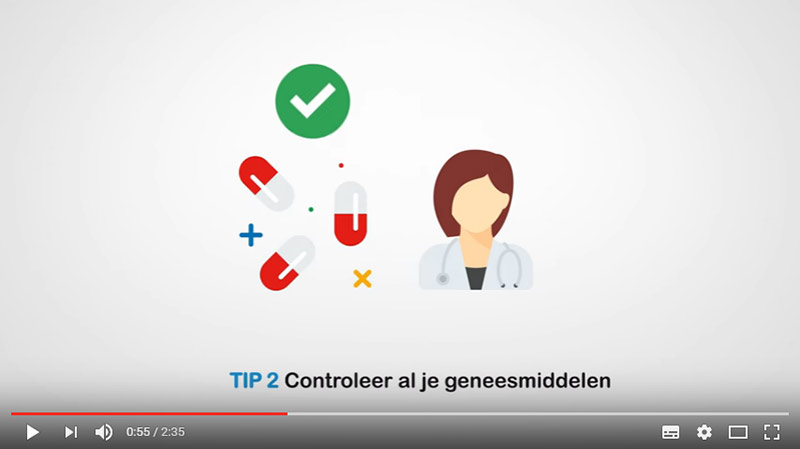
General public
www.dopingautoriteit.nl
Changes were made to the structure of the corporate website in 2016. Both the quick links and the regular content were altered. General links have also been assigned to the most important web pages (such as the prohibited list) so that users will always obtain the right information. There is a new quick link to the Doping Hotline. This is the place for anyone who wants confidential information about doping violations such as doping or trafficking. Requests for information can also be submitted anonymously.
We contributed seventeen reports of our own to the site in 2016. In addition, ANP news reports make up an important part of the topical information. Approximately 598 ANP news reports were published on the site in 2016. That is a substantial increase by comparison with 2015 (413) and 2014 (339). The aftermath of the WADA reports on the IAAF and particularly Russia, in addition to the various meldonium cases, generated a lot of reports.
Doping Email Line
The Doping Email Line is the front office for any questions relating to doping. It is manned by teams of four working in turn. All questions are processed within one working day and recorded anonymously in a database.
A total of 863 emails were received in 2016. That is more than 6% up on 2015, when 811 emails were registered.
In addition, the numbers of questions per subject were also monitored. Individual questions could be allocated to several subjects. The percentages for each subject can be found in the table below. As in 2015, two subjects stand out: checking whether a medicine is on the prohibited list (23.8%) and questions about dietary supplements (30%). The third place (just over 10%) is occupied by questions from students or schoolchildren.
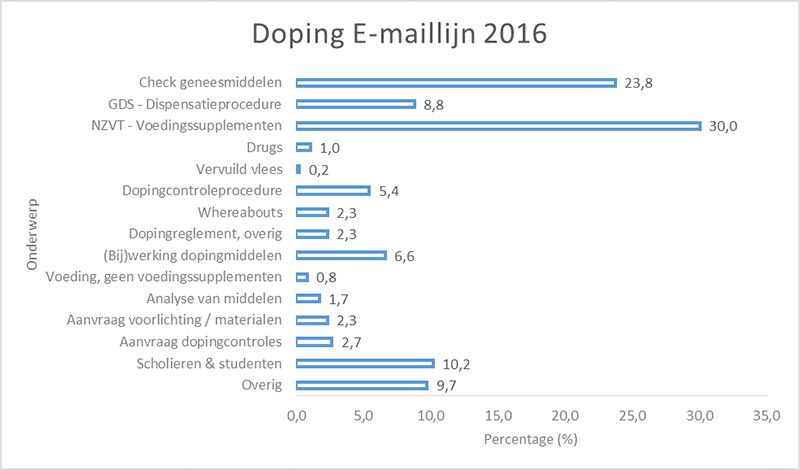
Club sports and elite sports accounted for 74% of the e-mails, fitness for 9%, and other sectors for 18%. There were eight reports of possible doping violations, a representative of the press sent an email on six occasions, and seven emails related to an athlete who was found positive.
Press conference
The postponed press conference from 2015 took place on 4 March. A press conference was also planned for 23 September but it was cancelled due to a lack of interest.
Press contacts
In 2016, the Doping Authority was approached on more than 400 occasions by the media, both for information and comments about current events and for answers to in-depth questions not related to topical issues. The CEO of the Doping Authority acts as spokesman. In his absence, or when specific topics are involved, the Doping Authority's Scientific Policy Officer sometimes stands in for him.